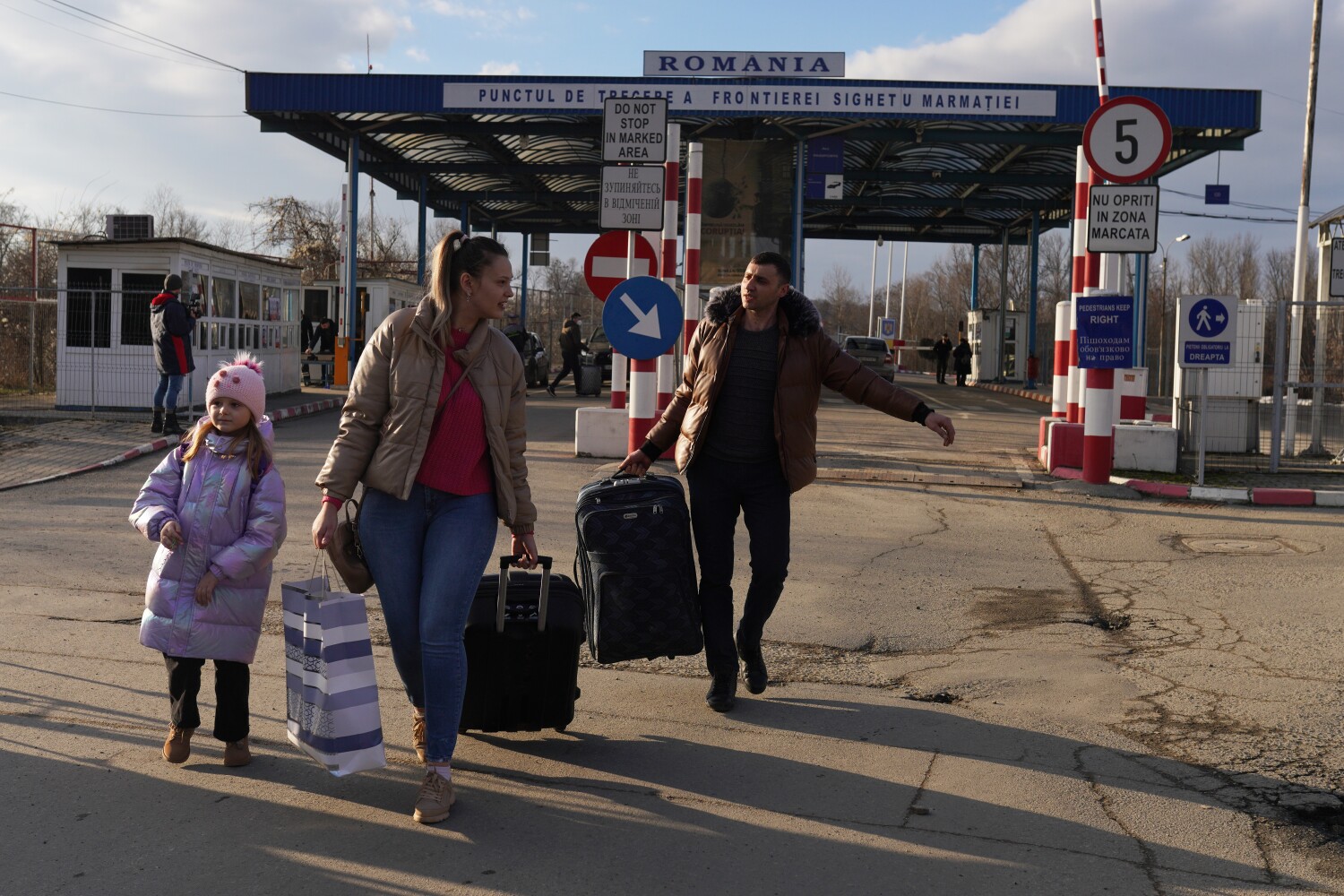Ukrainian conflict refugees search less-jammed border crossings
[ad_1]
Simply final month, Yana Bebko strolled throughout Independence Sq. with Dario Böhm — a German man she’d met on a matchmaking website — reassuring him that there was no manner Russian President Vladimir Putin would invade Ukraine. Two weeks later, Russian tanks rolled throughout the border, bombing buildings and whole cities. A whole lot have been killed, and greater than 2 million have change into refugees.
Since Russia’s invasion, the western Ukrainian metropolis of Lviv has change into a treacherous bottleneck. Native authorities estimate that 100,000 folks arrived on Friday, and at the least one other 100,000 on Saturday. On Tuesday, Lviv Mayor Andriy Sadoviy stated the town was struggling to deal with and feed greater than 200,000 internally displaced folks. He appealed for assist from worldwide and humanitarian organizations.
On the roads connecting Lviv to Poland, vehicles are backed up for miles, and with plenty on foot, it’s taking days simply to go border safety, with little obtainable shelter within the freezing chilly.
“There’s no manner by means of, and if you happen to go, it’s not protected,” stated Bebko, 31, who works for a trend label in Kyiv, explaining that not solely had been the traces too lengthy, however the prepare journey to Lviv now appeared too harmful because the mayhem of conflict had folks “combating to get on.”
Greater than 1 million Ukrainians who instinctively headed west — away from the Russian forces — have already crossed into Poland, and numerous extra who’re nonetheless making an attempt to get there should now watch for days, or abandon their plans altogether. It’s the fastest-paced refugee disaster Europe has seen since WWII, the U.N. has stated.
Bebko is among the many a whole bunch of hundreds who determined that they stood a greater likelihood of creating it out by means of Hungary, Slovakia and Romania — all members of NATO and the European Union — which at the moment are seeing a whole bunch of hundreds arrive.
Many refugees have traveled for days by means of Ukraine’s countryside, taking slow-moving trains and hitching rides by means of winding roads to locations like Solotvyno, a sleepy mountain city of about 8,500 those who borders Romania. It’s considered one of Ukraine’s smallest border crossings, however even right here, hundreds have bid farewell to their brothers, fathers, sons and husbands. Grownup males as much as age 60, who wouldn’t be allowed to go away even when they needed to, keep to defend Ukraine’s cities.
Their farewells are something however rushed: Scores of vehicles snake up Solotvyno’s hilly roads, and a whole bunch sit in line for hours. Some carry small items of bags, others solely their backpacks, stuffed with unexpectedly packed garments and paperwork.
When younger Ukrainian troopers lastly wave them by means of the passport checks, the ladies and youngsters cross the slender, picket bridge over the Tisza River to enter Romania.
“We need to benefit from the blue sky — a sky with out bombs,” Bebko stated, her completely manicured fingernails juxtaposed towards a plastic cup of sizzling tea poured by a aid volunteer minutes after she arrived in Sighetu Marmatiei, on the Romanian aspect of the border. Subsequent to her, her pal Viktoriya Nikitenko, whom she’s recognized for greater than 20 years, turned her face towards the solar.
At first, the refugees got here from villages on this sparsely populated swath of western Ukraine, encompassed by the Carpathian mountains. However “there are such a lot of folks coming from the larger cities now,” stated Madalina Tamas, one of many lead coordinators for the various NGOs and civilians in Sighetu Marmatiei, who provide free sandwiches, blankets, translation and authorized companies. About 7,000 folks have already registered, she stated. As those that stay in Ukraine are starting to expire of meals and water, and with many now not contemplating Lviv protected, she’s getting ready the location for “many, many extra,” she stated.
The journey to security is treacherous. Components of the nation’s roads are destroyed or barricaded, and with bridges demolished to cease Russia’s advances, civilians are compelled to steadiness over rickety planks to cross rivers. A number of the humanitarian corridors created to permit trapped civilians to flee have been attacked by Putin’s forces. At one, three out of a household of 4 had been killed in an assault witnessed by journalists.
But as provides had been working low at nighttime, chilly basements and subway stations serving as bomb shelters, the civilians who arrive right here say they’d grown so determined that they took the danger of the journey anyway.
Bebko and Nikitenko, 42, had been relieved to have made it out in time. They hadn’t even tried the Lviv route — the tales, they stated, had been too daunting. As an alternative, they weighed the options, contemplating roadblocks, the areas beneath siege, the nation’s railway traces and their community of family and friends who may assist alongside the way in which. “In the event you make it out, I’ll fetch you — wherever that’s,” Böhm, the German Bebko had met on-line, instructed her.
“This was the one likelihood for us,” Bebko stated of the Solotvyno crossing. Bebko’s father, a businessman, and her brother, who owns three bars, are combating within the conflict, whereas her mom is trapped in her hometown, Kherson. “Fourteen folks in a single home,” all sheltering within the basement, she stated. Kherson fell to Russian troops earlier this week, however hundreds of locals at the moment are taking to the streets, waving Ukraine’s blue-yellow flag to defy the Russian occupation.
Conscious that not one of the new arrivals got here to remain within the distant mountain city, Romanians have equipped free buses or non-public rides. One man had come from the Czech Republic with a bus, and two biology college students had pushed their camper van from Slovenia to take refugees again.
Bebko and Nikitenko awaited Böhm. “Our hero,” Bebko stated, a drained smile on her face as he pulled up in his black Mercedes. The spare seats had been shortly stuffed by Tatjana and her 6-year-old twin daughters, Adina and Ariana. Tatjana, who declined to offer her final identify, labored in Ukraine on the manufacturing line, making pillows for a Germany-based firm. Earlier than having her youngsters, she labored at resorts and bars in Germany. Her husband works within the Czech Republic, the place she and the twins had been headed.
All of them stated they hoped to return to Ukraine quickly, when the conflict is over. “Ukraine will win,” Tatjana stated. Bebko nodded and added: “I simply hope all people will nonetheless be alive.”
Hruby is a particular correspondent.


